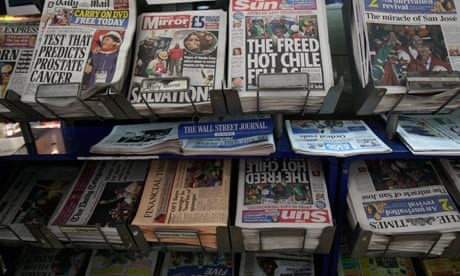A few weeks ago I blogged about the impact the hackgate scandal might have on coverage of climate change. My thesis was that while News Corporation was a crucial pedlar of junk science in the US and Australia, its UK newspapers tended to be more enlightened on global warming than many of its competitors – such as the Daily Mail.
Since then, I've been sent some interesting and previously unpublished analysis of British newspaper coverage of renewable energy. Carried out by the Public Interest Research Centre (Pirc), the research confirms the Mail's unusually anti-green stance, though it also highlights the remarkable degree of negativity that renewable energy receives in the UK press more broadly – including in the Sun.
The analysis looked at coverage of renewables in July 2009, a time when the public debate about climate science seemed almost won and the emphasis was shifting increasingly to the pros and cons of low-carbon energy sources. Pirc examined renewables coverage in the highest-circulation tabloid, mid-market and broadsheet dailies – the Sun, Daily Mail and Daily Telegraph respectively – and also included the Independent as a pro-environment counterweight. (Apparently the Guardian couldn't be chosen because of lack of local access to printed archives.)
The results don't make very happy reading for advocates of renewable energy. In the Mail, a staggering three-quarters of articles "centrally concerned with renewables" took a negative stance, and only 8% were positive. The Sun came out almost as anti-renewables as the Mail – though largely thanks to the efforts of Jeremy Clarkson, who singlehandedly accounted for two-thirds of the Sun's negative pieces, according to the research.
At the other end of the spectrum, the Independent was positive in almost two-thirds of stories focusing mainly on renewables and negative in just a few percentage of cases (though the ratio isn't so marked if you include stories only partly about renewable technologies). In between those extremes is the Telegraph, which was negative in 33–57% of cases, depending on whether you look at all stories mentioning renewables or just those with a more specific focus.
Although the ground might have shifted a little since 2009, I suspect these results broadly reflect the state of play today. They make for depressing reading partly because they suggest that potential solutions to global warming get an even rougher ride in the press than climate science itself – which is saying something. Interestingly, the results also seem to fly in the face of the assumption among many green campaigners that the way to engage the press and public on climate change is to focus on the solutions rather than the problems.
Is it significant that more than half the coverage of renewables in the mainstream British press is negative? I think it is – especially in a country where planning obstacles are a major barrier to new renewable energy installations, and in which the Institution of Mechanical Engineers has warned that our clean energy target may already be out of reach.
Of course, it's sometimes argued that the influence of the press on public opinion is exaggerated – and there may be some truth in that. But I think on an issue such as renewable energy, where fairly small numbers of "antis" can block or delay major installations, every negative story or piece of misinformation counts. (And there's no doubt that there is plenty of misinformation on this topic alongside all the legitimate opinion: to give just one example, the Mail recently made a big deal about the costs of renewable energy policies on household bills but inflated the true figure by more than 100% due to an almost laughable number of deliberate or accidental errors in their calculations.)
As Pirc researcher Tim Holmes points out in his introduction, press coverage is important because it can influence not only "what people perceive and believe" but also "what politicians think they believe". Indeed, politicians take the temperature of public opinion partly through the barometer of the press, and consistently negative coverage of renewables will doubtless "limit the perception of political space and impetus for political action", as Holmes puts it.
As for what hackgate could mean for all of this, that depends how the scandal plays out from here. On the one hand, ex-readers of the green-by-tabloid-standards News of the World might get picked up by the Mail on Sunday, which in my experience is just as anti-renewables (and anti-science) as its Daily stablemate. On the other hand, there is a happier scenario in which a post-scandal News International suddenly becomes positively pro-renewables. All that's needed, the Pirc research suggests, is for Clarkson to unexpectedly join the ranks of hackgate's Chipping Norton casualties.

Comments (…)
Sign in or create your Guardian account to join the discussion